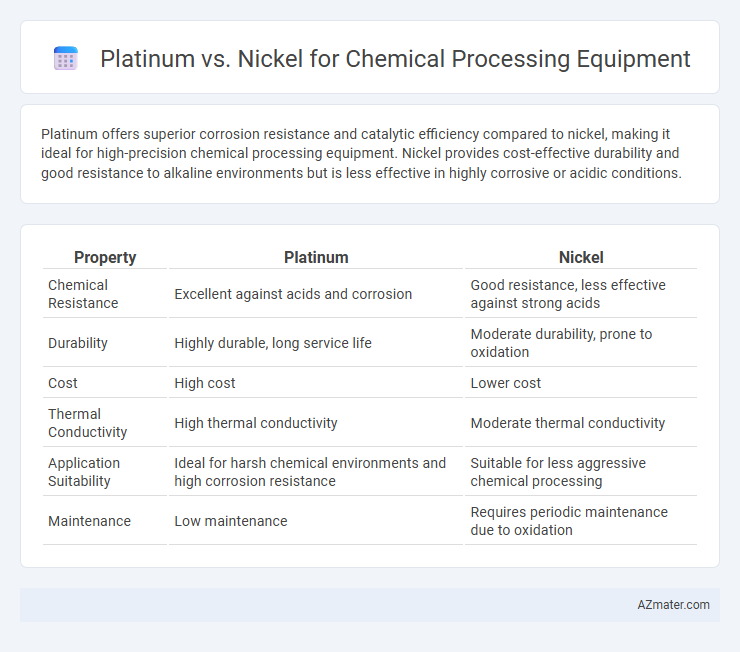Platinum offers superior corrosion resistance and catalytic efficiency compared to nickel, making it ideal for high-precision chemical processing equipment. Nickel provides cost-effective durability and good resistance to alkaline environments but is less effective in highly corrosive or acidic conditions.
Table of Comparison
| Property | Platinum | Nickel |
|---|---|---|
| Chemical Resistance | Excellent against acids and corrosion | Good resistance, less effective against strong acids |
| Durability | Highly durable, long service life | Moderate durability, prone to oxidation |
| Cost | High cost | Lower cost |
| Thermal Conductivity | High thermal conductivity | Moderate thermal conductivity |
| Application Suitability | Ideal for harsh chemical environments and high corrosion resistance | Suitable for less aggressive chemical processing |
| Maintenance | Low maintenance | Requires periodic maintenance due to oxidation |
Introduction to Platinum and Nickel in Chemical Processing
Platinum and nickel serve critical roles in chemical processing equipment due to their unique catalytic properties and corrosion resistance. Platinum excels in high-temperature environments and acidic conditions, making it ideal for catalytic converters and specialty reactors, while nickel offers strong durability and oxidation resistance in alkaline and moderate temperature processes. The selection between platinum and nickel hinges on specific chemical reactions, operating temperatures, and cost considerations inherent to industrial chemical processes.
Material Properties Comparison
Platinum exhibits exceptional corrosion resistance, high melting point (1,768degC), and superior catalytic activity, making it ideal for harsh chemical processing environments. Nickel offers good corrosion resistance and a melting point of 1,455degC but is more susceptible to oxidizing acids and high-temperature degradation compared to platinum. The superior chemical inertness and mechanical strength of platinum enhance equipment longevity and performance in aggressive chemical reactions.
Corrosion Resistance
Platinum demonstrates superior corrosion resistance compared to nickel in chemical processing equipment, maintaining its integrity in highly acidic and oxidative environments. Nickel offers adequate resistance in less aggressive media but tends to corrode under strong acids and high-temperature conditions. Selecting platinum minimizes maintenance costs and downtime by preventing corrosion-related failures in critical chemical processing applications.
Cost Analysis and Economic Considerations
Platinum offers superior corrosion resistance and longevity in harsh chemical processing environments but comes with a significantly higher initial cost compared to nickel. Nickel provides a more cost-effective alternative with good chemical resistance, making it suitable for many applications where budget constraints are critical. Economic considerations involve balancing the upfront investment in platinum against potential savings in maintenance and replacement expenses over time.
Thermal and Mechanical Performance
Platinum exhibits superior thermal stability and corrosion resistance compared to nickel, maintaining structural integrity at temperatures above 1,700degC, making it ideal for high-temperature chemical processing applications. Nickel offers excellent mechanical strength and toughness at moderate temperatures up to 1,400degC but can suffer from oxidation and phase changes under extreme thermal conditions. The choice between platinum and nickel hinges on specific process temperatures and mechanical stress requirements, with platinum favored for extreme environments and nickel for cost-effective, moderate thermal performance.
Chemical Compatibility and Reactivity
Platinum exhibits exceptional chemical compatibility and inertness, resisting corrosion and oxidation in highly acidic and oxidative environments, which makes it ideal for chemical processing equipment handling strong acids, chlorine, and other aggressive chemicals. Nickel, while chemically resistant to a range of alkalis, reducing agents, and mildly acidic solutions, is more prone to corrosion in oxidizing acids and halogen media. The superior resistance and non-reactive nature of platinum ensure minimal contamination and longer equipment life in harsh chemical processes compared to nickel.
Longevity and Maintenance Requirements
Platinum offers superior longevity in chemical processing equipment due to its high resistance to corrosion and chemical attack, significantly reducing the frequency of replacements. Nickel, while more cost-effective, tends to require more frequent maintenance because it is less resistant to harsh chemicals and high temperatures. The extended lifespan and lower maintenance demands of platinum make it ideal for critical applications where equipment downtime must be minimized.
Environmental Impact and Sustainability
Platinum offers superior corrosion resistance and longevity in chemical processing equipment, reducing the need for frequent replacements and minimizing waste generation compared to nickel. Nickel production, however, involves higher energy consumption and greenhouse gas emissions, contributing more significantly to environmental pollution. Choosing platinum alloys can enhance sustainability by improving equipment durability and lowering the overall environmental footprint of chemical plants.
Popular Applications in Chemical Processing
Platinum and nickel are extensively used in chemical processing equipment due to their corrosion resistance and catalytic properties. Platinum excels in high-temperature applications such as catalytic converters and hydrogenation reactors, where its superior resistance to oxidation and chemical attack is crucial. Nickel is favored for equipment like heat exchangers and pressure vessels in alkali and acid processing due to its excellent durability and cost-effectiveness in moderately aggressive environments.
Choosing the Right Material for Specific Processes
Platinum offers exceptional corrosion resistance and catalytic properties, making it ideal for highly acidic or oxidative chemical processing environments. Nickel provides strong mechanical strength and resistance to alkalis and reducing agents, suitable for processes involving caustic or mildly corrosive chemicals. Selecting the right material depends on the chemical composition, temperature, and pressure of the process to ensure durability and optimal performance.

Infographic: Platinum vs Nickel for Chemical Processing Equipment
 azmater.com
azmater.com